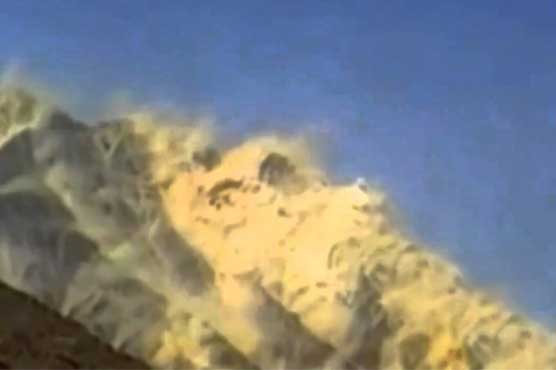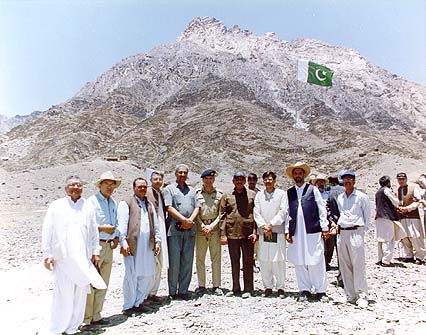Youm-e-Takbir: The day when the mountains shook

On this day, Pakistan became the seventh nuclear power in the world
LAHORE (Web Desk) – May 28 is a day that carries immense significance in the history of Pakistan as the country became a nuclear power on the very same date back in 1998 after a team of nuclear physicists, led by Dr Abdul Qadeer Khan, conducted seven nuclear tests at Chagai in Balochistan, thus making the country the seventh nuclear force in the world and the first Muslim country to achieve the feat.
Witness the colours of the mighty mountains changing
The day is celebrated in the country by the hoisting of the national flag at various governmental buildings along with the organising of various award-giving ceremonies and the arrangement of special programmes on the media in order to highlight the importance of the day for the country.
Despite multiple warnings from the United States and other important countries, India went on to proceed with her nuclear programme whilst labelling its use for peaceful purposes. Pokhran-I or Smiling Buddha was India’s first ever nuclear explosion test carried out in 1974. The international community had reservations regarding how Indira Gandhi would handle the bomb despite assuring the world that it intended harm to none.
Zulfiqar Ali Bhutto promptly grasped the magnitude of the development and vowed that Pakistan would not bow down before Indian aggression under any circumstances and that the country would also develop an atomic bomb of its own to assure the balance of power in the sub-continent. The country embarked to develop a nuclear programme of its own, primary research work of which was done at the Kahuta Research Laboratories, now named after the nuclear scientist Dr Abdul Qadeer Khan, as ‘Khan Research Laboratories’.
Z.A.Bhutto addresses nation after Indian nuclear tests
24 years later, on May 11, 1998, India conducted three nuclear explosions at the Pokhran Test Range, an area in Rajasthan 150km away from Pakistan’s border. One fusion bomb and two fission bombs were exploded during the tests. A couple of days later, two more fission bombs were exploded. The series of explosions, named as Pokhran-II, made India the sixth nuclear power in the world and a huge threat for its neighbouring country, Pakistan.
In the next 17 days, Pakistan faced enormous international pressure not to carry on with the nuclear explosions. From the president of the United States to the Prime Minster (PM) of the United Kingdom, the country’s leadership was contacted multiple times a day to withdraw from progressing with the nuclear programme but no avail.
On May 28, 1998, Pakistan successfully tested five underground nuclear explosions at the Chaghai hills in Balochistan at around 3:15pm PST – the tests were named as Chagai-I. The explosions were so powerful that they changed the colour of the mountains and the dust settled above them rose a significant degree. The team of scientists, army and government officials witnessing the spectacle before their very eyes could not resist raising slogans of Nara-e-Takbir to which the response of Allah-u-Akbar was given by an emotionally triggered crowd.
On May 30, 1998, the country conducted two more nuclear explosions at the Kharan Desert in Balochistan which were named as Chagai-II. Thus India’s seven blasts were equated by the seven conducted by Pakistan.

Immediate scenes of the Chagai hills after the blasts
The reason behind selecting this very area to conduct the nuclear explosions was because of the absence of human and animal life there. It was also claimed that the safety measures adopted in this regards ensured that no radiations spread because of the blasts.
PM Nawaz Sharif informed the nation about the paramount achievement, further stating that the country was also ready to face international sanctions if placed any. US president Bill Clinton disregarded Pakistan’s nuclear tests and stated that the country missed quite an opportunity to improve its political standing in the eyes of the world, further adding that as the country was not the first to test the nuclear weapons "two wrongs do not make a right".
Scenes in Pakistan after announcement of successful nuclear explosions was made
Pakistan maintained that it established its nuclear programme for minimum nuclear deterrence against any aggression. Various countries including the US, France, Canada, Sweden along with international organisations like the International Monetary Fund (IMF) placed sanctions upon Pakistan. Japan even abandoned diplomatic ties with Pakistan for the time being. Sanctions from the country were later lifted during the tenure of George W. Bush.
The individuals given credit for leading the country’s atomic research program include Zulfiqar Ali Bhutto, Zia-ul-Haq, Munir Ahmad Khan, Dr Abdul Qadeer Khan, Dr Samar Mubarakmand and Nawaz Sharif. It is also said that Bhutto was hanged because of pursuing his quest to make Pakistan a nuclear power despite foreign warnings.

Team of Pakistani scientists at Chagai hills
Pakistan has also been involved in various controversies related to nuclear proliferation as the country has been alleged of having transferred nuclear assets to various other states including Iran, North Korea and Libya.
The country is neither a member of the Non-Proliferation Treaty (NPT) or the Comprehensive Nuclear-Test-Ban Treaty (CTBT) primarily because of various reservations it has over both the treaties. Possessing nuclear weapons has also served Pakistan in a way that it has been able to stand up to India and look it in the eye. The 2001-02 and the 2008 standoffs between both the countries always had the imminent threat of a nuclear war hanging above however nuclear weapons were not deployed in both cases by any of the belligerents keeping in view the amount of destruction they posses to inflict on either side.
Undoubtedly, Pakistan’s defence has been made impregnable through the nuclear weapons it made in 1998 and has been able to maintain till date. The country’s nuclear assets are regarded the most safely kept in the entire world whereas the missile system possessed by Pakistan is also one of the most technologically advanced in the world thus ensuring that foreign powers get a clear cut idea that they are dealing with a nuclear power whenever things come to a negotiating table.
The feature story has been written by Sultan Malik.


